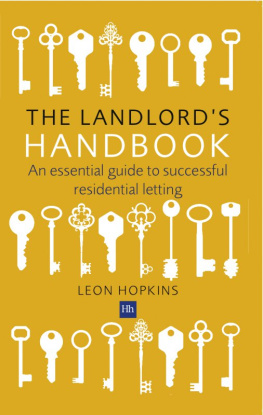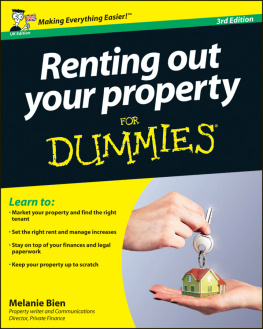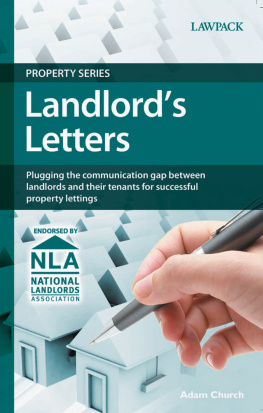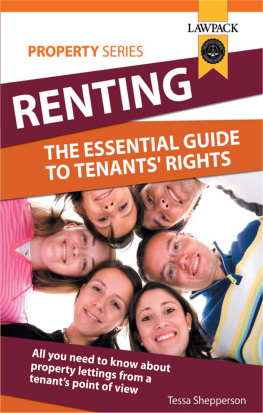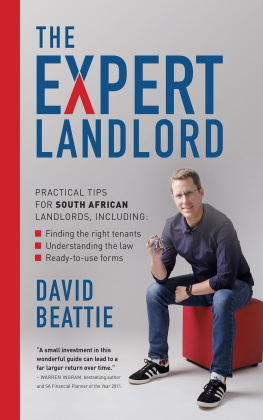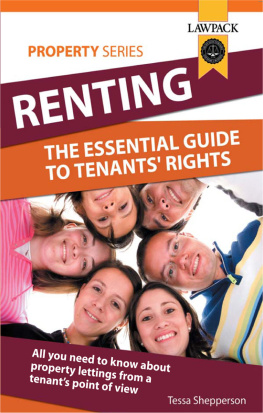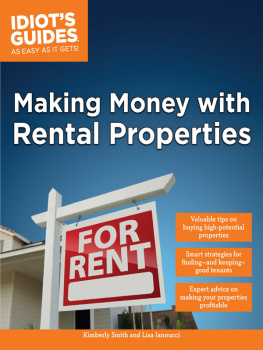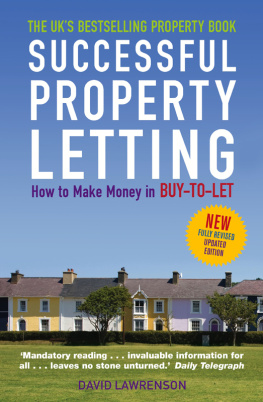The right of Leon Hopkins to be identified as Author has been asserted in accordance with the Copyright, Design and Patents Act 1988.
A CIP catalogue record for this book can be obtained from the British Library.
All rights reserved; no part of this publication may be reproduced, stored in a retrieval system, or transmitted in any form or by any means, electronic, mechanical, photocopying, recording, or otherwise without the prior written permission of the Publisher. This book may not be lent, resold, hired out or otherwise disposed of by way of trade in any form of binding or cover other than that in which it is published without the prior written consent of the Publisher.
No responsibility for loss occasioned to any person or corporate body acting or refraining to act as a result of reading material in this book can be accepted by the Publisher or by the Author.
Making the Life of a Landlord Easier
Being a landlord is both rewarding and demanding.
Good landlords know that providing housing for tenants can bring handsome financial returns, as well as the satisfaction of fulfilling a social need.
They also know that it is not always easy being a landlord. Not all tenants are as well behaved as they might be; a few may be downright devious. And then there are the 50-plus Acts of Parliament and 70-plus sets of regulations concerning private rentals that landlords have to know about and comply with.
Aided by the advent of buy-to-let mortgages, many people who would not previously have considered renting property have moved into the market because of its investment potential. There are also significant numbers of accidental landlords who have either inherited property they cannot live in but prefer to keep, or have a property that they could not sell when moving.
This book is designed to help them all, debutant landlords and seasoned investors alike, by providing a concise summary of the ins and outs of being a landlord, the decisions to be made and actions to be taken and how best to approach and deal with them all. It tackles business and financial risks, as well as legal requirements and regulatory demands.
A guide to the essentials
Starting with the question why let residential property?, the guide moves on to look at such topics as finance, suitable property, licensing, finding suitable tenants, tenancy agreements, possession procedures, repairs, grants, taxation and insurance in short, all the major areas of importance to landlords in their letting businesses.
With so many pieces of legislation to deal with, any guide could easily become too detailed. My aim has been to give an overview rather than a legal treatise, and to provide easy access to a host of references for those who need to look up more detailed aspects of legislation and official guidance.
Primarily I have dealt with the law as it currently exists in England and Wales, whilst endeavouring throughout to point landlords from Scotland and Northern Ireland to major differences in the law that affect them, and also to sources of more detailed information. Although the guide covers the main areas of legal responsibility, it is certainly not intended to be an exhaustive explanation of all requirements faced by private landlords. And it is not a substitute for legal advice landlords faced with unusual or complicated circumstances, or who are unsure about any aspects of what might be required, should always seek professional advice.
Throughout I have included examples of actual situations that illustrate the demands, and sometimes the pitfalls, of being a landlord.
My intention has been to provide a primer for newcomer landlords, and a reliable reference book for old hands an accessible, dependable guide to the essentials of letting, in order to make life as a landlord that bit easier.
For this reason I have also included a Jargon Buster section, giving brief explanations of the more common of the many technical terms that landlords may come across in their letting businesses.
Tenants and prospective tenants will also find essential information in the guide about what is expected of landlords, about required property and safety standards, and their own legal rights and responsibilities when taking on tenancies.
LH, June 2010
Leon Hopkins is editor of the website: www.residentiallandlord.co.uk
His previous titles include The Hundredth Year, Budgeting for Business, Cash Flow and How to Improve It and The Audit Report.
1. Why (and How to) Let Residential Property?
For most people, letting is primarily a financial proposition; a means of making money and accumulating wealth. And if done properly, it can certainly live up to financial expectations. Among those attracted to the rental market are some high-profile sportsmen and women, including, famously, former Liverpool striker Robbie Fowler, who is reputed to own over 100 residential lets in the Oldham area.
Landlords whether they own one flat or a portfolio to rival Fowlers benefit from both rental income and the rising value of the properties they own. Although in 2010 house prices dipped 10% below the peak reached in October 2007, figures produced by the mortgage lender Nationwide suggested that even this meant that, over the previous 15 years as a whole, house prices had more than trebled.
Landlords who owned residential property during that period have done very well. Despite economic difficulties in the 2007-2009 recession and subsequently, relatively few landlords sold up; most retained or even increased their property portfolios in the expectation of rising property prices in the future.
Those who had not overstretched themselves by simply borrowing too much were well able to sit out the downturn; partly because when the housing market is flat or falling fewer people are interested in buying their own homes, more decide to rent, and higher demand translates into rising rents.
There is also a social aspect to letting providing much needed housing. Although a few landlords try to cut corners and earn themselves a bad name as a result, very many more take pride in the socially responsible role they have to play. It is not only people who cannot afford to buy who decide to rent property. In fact a very large proportion of the population choose to rent at some point of their lives for personal or family reasons, for work or for study.
Renting also leaves people relatively free to move around from town to town: meaning that the rental sector contributes to the economic health of the country by helping to sustain a more mobile workforce.
The rise of regulation
However, because housing is so central to the wellbeing of families, letting is an area that is highly regulated and has become more so over recent years.
Rented houses must be of an adequate standard and must certainly not expose tenants, or anybody else for that matter, to any dangers to life, limb or health. Neither will the community as a whole, or the courts in particular, tolerate tenants being thrown out of their rented homes without good reason, and even then not without first going through formal procedures. Nor should tenants be harassed or otherwise prevented from the quiet enjoyment of their rented homes (to use the phrase enshrined in decades of English Common Law).

